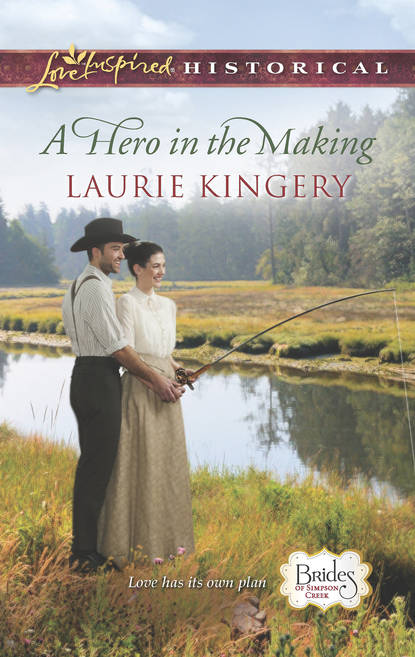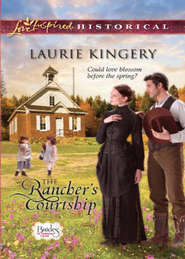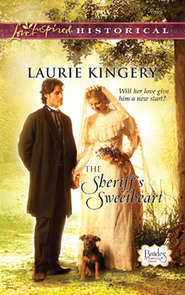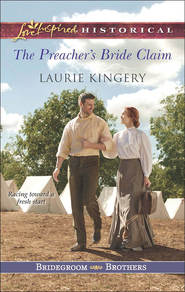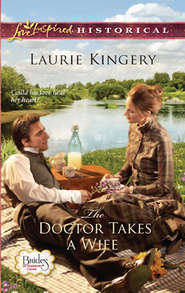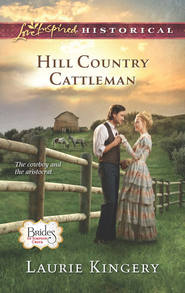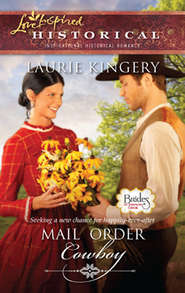По всем вопросам обращайтесь на: info@litportal.ru
(©) 2003-2025.
✖
A Hero in the Making
Настройки чтения
Размер шрифта
Высота строк
Поля
Kate giggled. “Of course not! I don’t need it for anything, but my aunt’s buying a bottle,” she said, indicating Mrs. Patterson wading through the throng toward Bohannan. “She suffers from rheumatism, you know, and what Dr. Walker’s prescribed so far hasn’t helped much.”
“Well, you’ll have to let me know if it works for her,” Ella said.
“The man helping Salali certainly is a nice-looking fellow, isn’t he?” Kate said.
Even as Ella followed her friend’s gaze, she saw Bohannan raise one empty crate triumphantly. “One box gone, Mr. Salali!” he called.
But there were still pint amber bottles in the other crate, and now those who had not bought a bottle surged forward, panicked that they might have missed their chance. Ella saw the medicine-show man could hardly keep up with the flow of coins.
“He is handsome, even if he’s helping to peddle snake oil,” Ella said. “He came to the café to buy sandwiches a little while ago. Say, I need to get started on my supper menu—why don’t you come over to the café and we can have lemonade while I cook the chicken for supper? I’ll tell you all about how he rescued me,” she said with a tantalizing wink.
It had been too long since she and Kate had had a cozy chat, now that Kate had a beau. For once she would have something interesting to talk about—she would not just be listening to Kate tell about what her beau had said and done. Ella would enjoy telling the other girl about the stranger’s saving her from the drifter, even if she no longer believed in his sincerity.
Kate’s eyes widened. “He rescued you? From what? It sounds thrilling! Oh, but I can’t. I promised my aunt I’d help her tend the store the rest of the afternoon since Gabe and I are going for a ride tonight in his buggy.”
Ella took an involuntary step backward, keeping her smile pasted on her face, even if her friend’s words had caused pain and jealousy to ping through her. Ever since the barbecue and dance the Spinsters’ Club had held this summer at Gilmore House, the mayor’s palatial home, her friend Kate had been oh-so-busy with Gabe Bryant, a lawyer who practiced in Simpson Creek. She was always stepping out with him, getting ready to step out with him or thinking about the marriage proposal she hoped would come soon.
Ella sighed inwardly. She didn’t begrudge Kate her beau, and she was happy for her, Ella told herself. She’d had a good time at the barbecue herself, and had danced nearly every dance with the gents who had attended. But after that evening, her lackluster life went on as before.
“Can you spare a few minutes to come into the mercantile and tell me about it?” Kate asked. “I’ve got to admit, you’ve got me intrigued,” she said, her gaze darting between Ella and Bohannan. The other crate was now empty also and Bohannan appeared to be consoling disappointed townsfolk.
“No, I really have to start working on supper,” Ella said. “I’m sure I’ll see you sometime,” she said, keeping her tone carefree as she turned to go. “It really wasn’t that important.”
She crossed the street diagonally to the saloon, and back to the hardscrabble reality of her existence.
* * *
“You made a good haul today,” Nate said to Salali as he parked the medicine-show wagon under a tree in the meadow across from Simpson Creek’s white-clapboard church. “Sold every bottle. You’ll have to make some more before we go to any more towns.” He unhitched the horses, hobbling them before he let the geldings loose to graze, and saw that Robert had taken a cross-legged seat under one of the live oak trees, pulled off his striped turban and thrown it onto a nearby bush.
I’d faint dead away if he ever offered to help with the unhitching, or at least thank me, Nate thought. But he reminded himself that under the terms of their “deal,” he was responsible for the horses and wagon, and assisting Salali when the latter did shows, so he supposed his employer really didn’t owe him any help. Nate’s “pay,” in return, was his meals and, eventually, a ride as far as Council Bluffs, Iowa, where he planned to take the new Transcontinental Railroad to California.
In California he could finally be somebody. He’d loved his father, who’d raised him alone after his mother died when he was only a baby. But all his life he had wanted to become something more than his father had been, a jack-of-all-trades who’d taken Nate to a series of small towns to live. Cal Bohannan had been content with that. Nate wasn’t.
His cousin on his mother’s side, Russell Blake, had gone to San Francisco and had become the proprietor of a grand hotel, and moved in influential circles in that thriving town. He said he planned to run for mayor in the next election, and he’d offered Nate the chance to become his partner in the hotel, with a further promise to introduce him to the powerful men he counted as friends. Nate could become a powerful man, too.
But would he ever get to San Francisco? So far, Salali didn’t seem to be in any hurry to even get out of Texas.
The day after Nate met Salali, they’d put on a show in some small east Texas town, and he’d been impressed with the man’s effortless showmanship and his personal magnetism—and the way coins poured into his hands in exchange for pint bottles of the elixir. Salali seemed inexhaustible.
Nate wasn’t so impressed anymore. Now that he had someone else to do the hard work of taking care of the horse and the wagon, navigating their journey from town to town and obtaining their vittles, Salali became a different person between shows. He seemed to feel his sole contribution to the success of the medicine show should be mixing up the elixir—a combination of laudanum, sassafras and ginseng roots, actual snake oil, and at least half alcohol—when the supply ran low.
“Mmm,” Salali muttered, his mouth full of the sandwich he’d given Nate the money to buy before the show.
“Good sandwich? You should have seen the pretty girl who made it for you,” Nate said. “Did you see her in the crowd? Tiny and dark-haired, with big brown eyes?”
Salali shook his head and mumbled something through a last mouthful of sandwich that might have been a disinterested “no.”
“Why don’t we go back to her café for some supper tonight? The food’s cheaper than in the hotel, and you could meet Miss Ella. I’m sure she’d be right fascinated to make your acquaintance.” And I could see her again. He didn’t know why that was so important; after all, he wasn’t about to abandon his goal of reaching San Francisco to take root in Simpson Creek. But there was something so compelling about the plucky, hardworking Ella...
“She wasn’t fascinated enough to buy any,” his employer muttered.
Nate shrugged. “She’s had to mind her pennies. She wants to build her own restaurant so she doesn’t have to use the back room of the saloon anymore. What do you care that she didn’t buy any elixir? We sold ’em all.”
He wished he could take back the words after he saw Salali’s eyes light up when he said “saloon.” Within days of their meeting, Nate had discovered his employer had two vices, gambling and whiskey. But what other choice had Nate had, on foot in the middle of nowhere after his horse had broken a leg and he’d had to put him down? Hot and sweaty from carrying his banjo, saddlebags and saddle, he’d come across the medicine-show wagon, broken down about five miles from where Nate’s horse had put his leg in a hole. Nate had repaired the broken axle for the medicine-show man, and regretted the deal he’d made with him ever since.
After Salali’s last drunken binge, he’d begged Nate to keep him from succumbing to his vices again.
Evidently he’d forgotten that now, however, for he said, “That saloon got poker? Faro? Why don’t I go make us a stake gambling while you see your sweetheart? I won’t drink, I promise. Or maybe just one whiskey, just to wet my whistle. What d’ya say, Nate-boy?”
It was a familiar wheedle, and one Nate had resolved to ignore forever more. When Salali gambled, he drank then lost every penny in his pockets. Then he’d lie around in a drunken stupor for the next day, and wake up cranky as a wet rattlesnake.
Sorrowful and repentant after his last binge, he’d agreed to let Nate hold on to their money after a show, so Nate resolved to stick to his guns and do just that. The money was safe in its secret hiding place on the wagon. Even if it meant neither he nor his employer had anything more to eat today than the last of the buffalo jerky, he wasn’t going to let Salali get close to temptation. If they went to town, Salali would have to agree to go into the café via the back entrance, not through the saloon. He figured the medicine-show man wouldn’t agree, but Nate would have liked to see Ella Justiss again, even for a brief time.
“I can’t let you do that, compadre,” Nate said firmly. “You told me not to let you gamble away the profits, or drink liquor, and I’m sticking to that.” He tried to ignore the way Salali’s eyes glared at him in thwarted anger. “If you won’t agree to only visit the café, we’ll stay right here. I’m just doing what you asked me to do, remember?”
Salali yawned widely, as if he didn’t care one way or the other. “Think I’ll take me a siesta,” he muttered.
Maybe he’d change his mind about supper when he woke up, Nate thought. “Think I’ll take a nap, too,” he said, but he was talking to empty air. The medicine-show man was already snoring.
His employer had once admitted to him while drunk that his lately adopted surname, Salali, meant “Squirrel” in the Cherokee tongue, not “Generous Heart.” But there was nothing of the industrious planning-for-winter rodent or of generosity in Robert Salali, and Nate had to wonder why the chief had given it to him—and what he’d really done for the Indian. He didn’t believe for a minute that story of Salali killing a bear—the man was much too indolent. As Nate spread his blanket under the wagon to take advantage of the shade, he wondered what the Cherokee word for “lazy” was.
Someday soon, he and Salali would have to part ways, he thought, settling himself on his blanket and listening to his employer snore. Their arrangement wasn’t working. At the speed they were meandering through Texas, it would take years for Nate to reach Iowa, and the business opportunity in San Francisco that had been promised to him would have vanished.
* * *
It was evening when Nate awoke. He saw that Salali was already stirring around, his turban back in place, his clothes brushed. Hope rose in Nate that his employer had seen the sense of what he’d said, and decided to accompany him to supper—if it wasn’t already too late, he thought, wondering what time the petite pretty woman closed her establishment.
“You going to Ella’s café with me?” Nate asked. “I’ll bet it’ll be the best supper we’ve had in a long time.” He stepped up to the cabinet on the side of the wagon and used the comb and mirror that he kept there to spruce up a little. Maybe he ought to give himself a quick shave, he thought, after glancing at his beard-shadowed face, and pulled out his razor and a bowl, which he’d fill with water from the burbling creek just a few feet away.
“No,” Salali said, a challenging note in his voice. “I’m going to go play faro and drink as much whiskey as I please, and don’t think you’re going to tell me different.”
Nate shrugged, trying to tamp down the anger that boiled within him. There was no arguing with Salali when he got this way, but he didn’t have to make it easy. Surely if he remained firm, his employer would thank him one day. “I don’t know how you’re going to do that,” he said, taking the bowl and striding toward the creek. “You don’t know where the money we made today is, and I’m not about to tell you.”
He heard Salali following him, and figured he was going to try to wheedle him into changing his mind. He never saw the other man raise his arm, but a second later, he felt a crushing blow to the back of his head and felt himself falling. The fading light of dusk went black.
* * *
Ella had just dressed and was heading out the back steps of the boardinghouse the next morning with a basket full of eggs to scramble and a covered dish of bacon to fry for her café’s breakfast offering when she saw Detwiler trudging across the street toward her, looking as if he’d lost his last friend. His normally hound dog–droopy features were saggier than usual, and his eyes red-rimmed, as if he’d just been weeping.
Unease gripped her. While not of an overly cheerful nature, he was normally an even-tempered man. She hurried forward, alarm clenching her insides. “George, what’s wrong?”
“They wrecked the place, Miss Ella, that d— ’scuse me, Miss Ella, them awful snake-oil salesmen.”
Ella froze. “W-wrecked it? What are you saying?”
“Tore it up. Ever’thing inside is all smashed, ’cludin’ your café. Sheriff noticed a broken front window, and found it all smashed up inside. He came out to the house and notified me, and I just came from seein’ the damage. I’m ruined, Miss Ella. We’re both ruined.”
Ella felt a coldness wash over her despite the early warmth of the morning. She set the covered dish down on the doorstep, afraid her trembling hands would drop it in the next second. What Detwiler was saying didn’t make sense.





